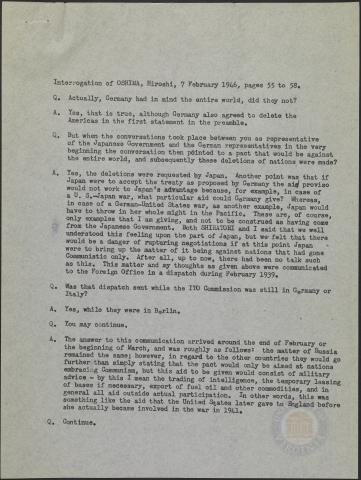
Page 2
| Parent | Request Form Accused - Incident: Excerpt from Interrogation of OSHIMA, Hiroshi, 7 February 1946, pages 55 to 58 |
|---|---|
| Date | 17 June 1946 |
| Language | English |
| Collection | Tavenner Papers & IMTFE Official Records |
| Box | Box 3 |
| Folder | General Reports and Memoranda from June 1946 |
| Repository | University of Virginia Law Library |
Interrogation of OSHIMA, Hiroshi, 7 February 1946, pages 55 to 58.
Q. Actually, Germany had in mind the entire world, did they not?
A. Yes, that is true, although Germany also agreed to delete the Americas in the first statement in the preamble.
Q. But when the conversations took place between you as representative of the Japanese Government and t he German representatives in the very beginning the conversation then pointed to a pact that would be against the entire world, and subsequently these deletions of nations were made?
A. Yes, the deletions were requested by Japan. Another point was that if Japan were to accept the treaty as proposed by Germany the aid proviso would not work to Japan’s advantage because, for example, in case of a U.S.-Japan war, what particular aid could Germany give? Whereas, in case of a German-United States war, as another example, Japan would have to throw in her whole might in the Pacific. These are, of course, only examples that I am giving, and not to be construed as having come from the Japanese Government. Both SHIRATORI and I said that we well understood this feeling upon the part of Japan, but we felt that there would be a danger of rupturing negotiations if at this point Japan were to bring up the matter of it being against nations that had gone Communisitc only. After all, up to now, there h ad been no talk such as this. This matter and my thoughts as given above were communicated to the Foreign Office in a dispatch during February 1939.
Q. Was that dispatch sent while the ITO Commission was still in Germany or Italy?
A. yes, while they were in Berlin.
Q. You may continue.
A. The answer to this communication arrived around the end of February or the beginning of March, and was roughly as follows: the matter of Russia remained the same; however, in regard to the other countries they would go further than simply stating that the pact would only be aimed at nations embracing Communism, but this aid to be given would consist of military advice – by this I mean the trading of intelligence, the temporary leasing of bases if necessary, export of fuel oil and other commodities, and in general all aid outside actual participation. In other words, this was something like the aid that the United States later gave to England before she actually became involved in the war in 1941.
Q. Continue.
